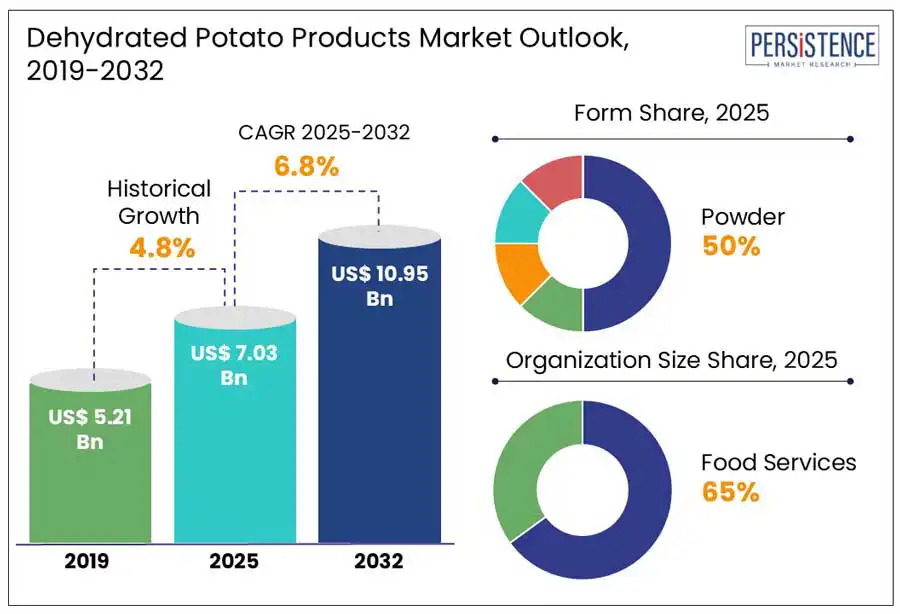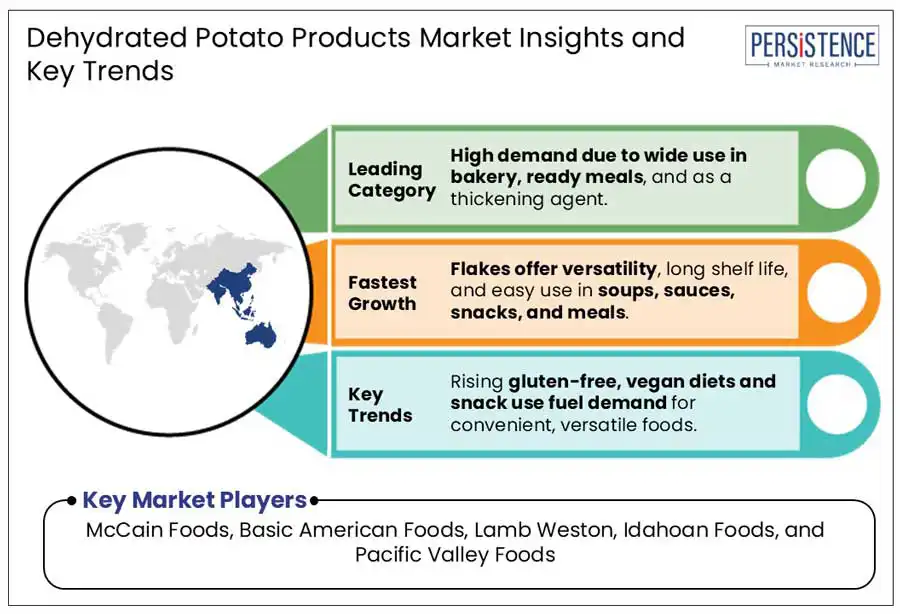ID: PMRREP35334| 180 Pages | 21 May 2025 | Format: PDF, Excel, PPT* | Food and Beverages

The global dehydrated potato products market size is projected to rise from US$ 5.20 Bn in 2025 to US$ 7.03 Bn by 2032. The market is further anticipated to register a CAGR of 6.50% during the forecast period from 2025 to 2032. According to the Persistence Market Research report, the rising consumer preference for convenience foods and ready-to-eat processed meals drives the dehydrated potato products market growth.
Dehydrated potatoes are produced by eliminating moisture from potatoes while retaining their flavor and nutrition. Due to their thickening properties, they can be easily incorporated into soups, salads, baked products, and various other food items, making them popular in commercial food production. They have a longer shelf life and are available year-round.
The younger generation and working couples in India are becoming increasingly health-conscious actively seeking various nutrient-dense food options. Dietary preferences are shifting toward ready-to-eat (RTE) foods. There is an increased demand for plant-based and vegan products, along with non-vegetarian options. High disposable incomes among urban families, combined with time constraints for meal planning, fuel the demand for meal replacement products, which is driving the market growth.

Key Industry Highlights
|
Global Market Attribute |
Key Insights |
|
Dehydrated Potato Products Market Size (2025E) |
US$ 5.20 Bn |
|
Market Value Forecast (2032F) |
US$ 7.03 Bn |
|
Projected Growth (CAGR 2025 to 2032) |
6.50% |
|
Historical Market Growth (CAGR 2019 to 2024) |
4.80% |
The dehydrated potato products market is experiencing strong growth, driven by the increasing preference for convenience foods. Changes in consumer taste profiles, higher disposable incomes, rapid urbanization, and busy lifestyles have led to an increasing demand for ready-to-eat food products. The popularity of vegetarianism and vegan diets also makes potatoes a coveted ingredient. Potatoes are high in carbohydrates, gluten-free, and rich in vitamin C, vitamin B6, phosphorus, niacin, and pantothenic acid, making them a nutritious addition to all food products. Dehydration methods, such as freeze-drying and drum-drying, have significantly improved product quality. For example, McCain Foods employs advanced food processing technologies and is renowned for its pre-fried French fries, frozen potato specialties, and dehydrated potato flakes.
The growing trend of incorporating dehydrated potato products into everyday food and beverage items, such as sports drinks and nutrition bars, is making them universally accessible. Furthermore, the growth of the frozen food and processed snack sectors, including products such as potato chips and mashed potato mixes has driven the demand for dehydrated potato flakes, granules, and powders. As they are gluten-free, they are ideal for individuals with celiac disease or gluten sensitivities.
Health-conscious consumers are increasingly avoiding high-calorie, additive-laden processed foods in favor of healthier alternatives, which is impeding the demand for dehydrated potatoes. Consumer perception also plays a significant role, as some view dehydrated products as highly processed food items high in sodium and sugar, and nutritionally inferior to fresh potatoes. When consuming dehydrated food, it is important to be cautious and eat smaller portions, as water removal increases the calorie density by weight. To address these challenges, the industry needs to focus on consumer education, adopt innovative dehydration methods, improve marketing strategies, and ensure that products remain affordable while maintaining quality.
Moreover, dehydrated potato products contain several additives such as sodium acid pyrophosphate, sodium metabisulfite, and butylated hydroxytoluene to enhance shelf life, texture, and appearance. Though considered safe, many consumers prefer cleaner products without any additives.
The rising demand for convenience foods and ready-to-eat (RTE) meals among busy, health-conscious consumers is anticipated to create numerous growth opportunities. The demand for shelf-stable and preservative-free food items will also fuel market growth. Advancements in food processing have improved product quality, flavor, and texture, making these products more appealing. The shift from fresh to dehydrated potatoes further supports market expansion, driven by their longer shelf life, cost-effectiveness, and easy storage.
The growing popularity of gluten-free and vegan diets, along with increased use in snacks, RTE meals, and instant mixes, continues to boost demand. Additionally, the growth of the foodservice industry, expansion of fast-food chains, and the rise of e-commerce are anticipated to make dehydrated potato products more accessible. The trend toward plant-based diets and the pet food industry’s growing demand for plant-based nutrition also contribute to market growth. Furthermore, innovations in dehydration technologies and sustainable packaging offer significant growth opportunities. In February 2025, McCain released its sustainability report, which stated that it was committed to regenerative agriculture, partnering with over 3,900 farmers globally to implement sustainable practices across 100% of its potato acreage by 2030.
By form, the potato powder segment is expected to dominate the global market, holding a revenue share of about 50% in 2025, driven by its widespread use in bakery products, ready-to-eat meals, and as a thickening agent in various dishes. With the growing demand for ready-to-cook products, potato powder is gaining popularity. It offers significant potential, especially as a gluten-free alternative to wheat flour. While currently more common in the foodservice industry, its use in households is increasing, particularly in soups, gravies, and curries. Powdered dehydrated potatoes are favored for ease of digestion, particularly among the elderly. They are high in fiber and rich in vitamin C. Additionally, they contain flavonoids that help regulate cholesterol and promote hair health.
The flakes segment is anticipated to witness the fastest growth in the coming years. Flakes are known for their versatility, convenience, and longer shelf life, and easy incorporation into soups, sauces, snacks, and ready meals. The evolving potato processing technologies, such as drum drying and vacuum packaging, have improved the product quality and shelf life.
Based on distribution channel, the food services segment is anticipated to dominate the dehydrated potato products market, holding the largest revenue share of 65% in 2025. The food services segment, including hotels, restaurants, fast food outlets, and cafeterias is driving demand, particularly with the expansion of food delivery channels. The rise of both full-service and quick-service restaurants, along with the increasing presence of national and international brands, is boosting product demand. Fast food chains such as McDonald's and KFC use dehydrated potato products for French fries, hash browns, and mashed potatoes, while restaurants, cafeterias, and QSRs, including Domino's and Taco Bell, incorporate them into soups, potato wedges, and loaded skins.
The retail channel is the fastest-growing distribution segment, with supermarkets and hypermarkets leading the market due to their wide reach, competitive pricing, and promotions. These retailers benefit from economies of scale, enhanced product visibility, and consumer data insights, making it easier for customers to discover and purchase dehydrated potato items.

North America market is expected to grow at the fastest CAGR of 8% from 2025 to 2032, driven by the rapid expansion of the U.S. processed food industry. The U.S. holds the largest market share, fueled by the rising demand for quick soups and salads. Processors employ advanced methods, technologies, and strict standards to preserve fresh-potato texture and flavor in rehydrated products. Additionally, the U.S. potato manufacturers offer a range of clean-label dehydrated options to address consumer concerns about ingredients.
Asia Pacific dominates the global dehydrated potato market, accounting for a substantial share of 69% due to favorable climatic conditions and high potato production in countries such as China and India. Market growth in the region is driven by the increasing use of dehydrated potato flakes in retail mashed potatoes, snacks, and as ingredients in soups, sauces, and baked goods. Major players in India, including Agistin Biotech Pvt. Ltd. and Agristo Masa Pvt. Ltd., are expanding their presence, while emerging players such as Goodrich Group are investing in modern processing plants, further strengthening the region's market position.
According to a research study, in October 2022, China is the world's largest potato producer, with over 4.81 million hectares dedicated to potato cultivation and a production volume of 90.32 million metric tonnes in 2018. This represents 27.36% of the global potato planting area and 24.53% of global potato production. Key players in China include Taimei Potato Industry Limited, Shandong Sinosure Agricultural Group, Hongji Agriculture, and Snow Valley Food Hebei Co., Ltd.
Europe is projected to lead the market and experience substantial growth from 2025 to 2032, fueled by rising consumer demand for convenient and frozen products, as well as the growing popularity of ready-to-cook meals due to the expanding workforce. Additionally, the increasing demand for bakery products, including whole grain, high fiber, and gluten-free options, further enhances the market potential for dehydrated potato products in the region.
The U.K. is the fastest-growing market in the region due to the growing demand for prepared foods and snacks, along with the expansion of the fast-food industry. The rising number of working individuals has accelerated the demand for convenience foods, boosting market growth. Germany holds the largest market share in the European dehydrated potato market.
The global dehydrated potato products market is highly competitive and fragmented, with global and domestic players offering a wide range of products and vying for higher market share. Companies are focusing on R&D and adopting growth strategies such as product innovation, strategic partnerships, and acquisitions to strengthen their market position. Investments are being made to improve potato cultivation techniques, with precision farming expected to reach new heights through Vultus's early disease detection service for potato crops, as reported by Potato News Today in March 2024. Additionally, advanced drying methods, such as vacuum, freeze-drying, cabinet or tray, spouted bed, ohmic, fluidized bed, and microwave drying, are being employed to preserve nutrients after processing.
The global market is projected to be valued at US$ 7.03 Bn in 2025.
The rising consumer preference for convenience foods and ready-to-eat processed meals is driving dehydrated potato products market growth.
The market is poised to witness a CAGR of 6.50% from 2025 to 2032.
The growing popularity of gluten-free, vegetarian, and vegan diets, along with increased use in snacks, RTE meals, and instant mixes, boosts demand.
Major players in the dehydrated potato products industry include McCain Foods, Basic American Foods, Lamb Weston, Idahoan Foods, and Pacific Valley Foods.
|
Report Attribute |
Details |
|
Historical Data/Actuals |
2019 - 2024 |
|
Forecast Period |
2025 - 2032 |
|
Market Analysis |
Value: US$ Bn |
|
Geographical Coverage |
|
|
Segmental Coverage |
|
|
Competitive Analysis |
|
|
Report Highlights |
|
|
Customization and Pricing |
Available upon request |
By Form
By Distribution Channel
By Nature
By Region
Delivery Timelines
For more information on this report and its delivery timelines please get in touch with our sales team.
About Author